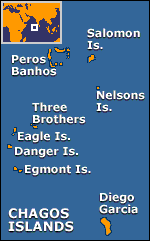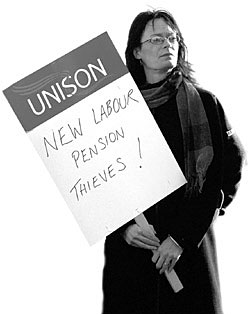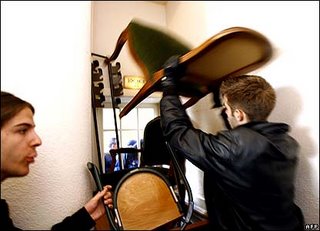
Longtime readers of this blog, if such people exist, may vaguely remember the guys and gals of
Lalit, a Mauritian socialist group who's name means "struggle," in Creole. They've been deemed worthy of mention here on a number of occasions for the campaign against the Anglo-American occupation of the Chagos Archipelago. Now, as a handful of the dispossesed islanders
prepare for an
all too brief visit to the islands from which they were evicted, Lalit have taken the opportunity to
update supporters on the campaign. What with Chagos being one of my pet issues, I thought I might pick out some of the highlights.
Central to their analysis is the conviction that the Chagos Archipelago is - or at least should be - part of Mauritius:
In a diplomatic conundrum, the Mauritian State is co-operating with the occupier, supplying its own vessel, "Trochetia", to the British for the trip, so that Mauritian citizens can visit part of Mauritius while it's illegally occupied by the British and US.
This is an idea which I think has a sound basing in international law and has considerable moral weight. That said, the Chagossians themselves - or at least their community leaders -
don't give a rat's arse about Mauritian sovereignty. Hardly surprisingly as the Mauritian government
don't seem all that concerned about them and indeed have
sought to deny their very existence.
This less than comradely relationship helps to contextualise another of Lalit's claims:
Today, the struggle to close the US military base and for reunification of Mauritius, is for the first time becoming a struggle in which the organizations of the Chagossian people are involved to a decreasing degree.
This is a surprising allegation and one which merits elaboration. Lalit assert:
The U.S. and Britain have between them managed, for the meantime, to drive a wedge between the Chagossians' right to return and their rightful struggle for reparations, on the one hand, and the overall struggle against militarism and against the capitalism that drives it, the very realities that robbed the Chagossians of the islands they lived on.
This, they suggest, has been done by offering the islanders small victories in exchange for important concessions:
[T]he case for reparations that the Chagossians have filed in the U.S. against the U.S. government and private companies that run the Base, came up for hearing on 14 February and will be continuing in March. The judges heard arguments as to whether the case can be entered in the US Courts. One interesting aspect of this case is that the U.S. law provides that lawsuits are inadmissable if they put into question U.S. foreign policy. This has, in turn, been a recent pressure on the leaders of the Chagossians and their lawyers to repeat again and again, as a kind of chorus, that they are "not against the military Base", even while ordinary Chagossians criticise the US for using their land for "killing other people" and even as Mauritians scratch their heads to understand what could be behind such unusually servile language.
This would seem to go someway to explaining Olivier Bancoult's curious assertion, "We can agree to co-habit with the Americans" (which I've
passed comment on previously).

Lalit view the decision by several Chagossians to relocate to the UK in a similar light:
Another tactic of this cornered British State, after it suffered a defeat in 2000 in its own Courts in the initial case on the right to return to Diego Garcia, is to assimilate the Chagossian community into the "metropole". British passports were issued to the Chagossians and their descendants, and the entire community is now in flux. From most families someone has left Mauritius, is leaving or is planning to leave for the U.K., where they believe work will be easier to find and the standard of education and social services is higher. Some then find the going tough in the UK, and return to Mauritius, as yet others are preparing to leave.
There is no question that many of
the Chagossians who have decided to come to the UK have done so having given up any hope of returning to the Chagos Archipelago. Indeed, Olivier Bancoult averred, "If Allen Vincatassin [the apparent leader of the Chagossian community in Britian] cared about his fundamental right to return to his homeland, he should have taken up the case against the British government, not come here and settled.” It seems unlikely, however, that "assimilation" is actually government policy. If it were, would they not have tried to make it a tad easier to make the trip? Xavier Siatous, who arrived in Crawley, West Sussex last year, pargues that the 1.5 million spent by the authorities on fighting the Chagossians in court could have paid for their airfares and taught them all English. In any case, Daniel Simpson suggests that it unlikely that anything but a minority of the islanders would make the trip to Britain even if they could.
In contrast to the strategy adopted by many Chagossian, Lalit advocate a more confrontational approach. In the run-up to the
World Social Forum which took place in Mumbai in January 2004 they attempted to organise, in conjunction with the Chagos Refugee Group (GRC), a ship to take people back to Diego Garcia as a protest. The idea blossomed from a single yacht into a "
Peace Flotilla" which would entail a number of boats making the trip:
What happened inbetween then and now was that the peace flotilla got massive support from people all over the world in peace groups. The flotilla captured the imagination of women's groups, environmental groups, political groups, human rights groups, peace groups and especially anti-military-base groups, and the peace flotilla brought them all together around this amazing shared idea. It was becoming a reality. And the mobilization around the flotilla, in turn, brought journalists from all over the world to make the issue widely known for the first time. And John Pilger's outstanding documentary, STEALING A NATION, then came and brought the issues quite literally centre stage. Thousands of British people reacted in anger at their Government's crimes.
When the peace flotilla gained ground, the British Government aided by the Queen, issued a regulation banning all Chagossians from all the Chagos Islands.
Feeling increasingly exposed, the British State began to negotiate. It offered, itself, to take the Islanders on a visit to all the Chagos Islands including Diego Garcia. It wanted a visit strictly under the control of the British State.

This, they argue, is how the present visit came about. Whether there assesment is accurate is hard to gauge. I'm tempted to dismiss it as braggadocio or trumpet-blowing and others including Nicholas Rainer have come to
quite the opposite conclusion: "The visit itself is a great achievement which can be attributed to the Chagos Refugee Group’s (GRC) indefatigable advocacy and its legal victory in the London High Court in November 2000." Nevertheless, the mere fact that the flotilla has attracted absolutely sero coverage in the mainstream media, at least insofar as I can tell, doesn't preclude the fact that it could have been a worry for the British and American governments.
Lalit continue to call for the closure of the base on Diego Garcia, but see this as part of a wider fight against
US bases around the world. They urge supporters to throw their weight behind the the first "Conference for the Abolition of all Foreign Military Bases" which is to take place in Ecuador sometime in March 2007 and include an invitation to the event at the end of their update.
While I don't agree with everything in their analysis, I appreciate Lalit's approach to the question of Diego Garcia. They offer a compelling and consistently radical critique of Anglo-American policy and appear to be prepared to do the work to back that up. I hope that the various tactical disagreements outlined above are not indicative of a permanent division between Lalit and the GRC. The movement in defence of Chagossian rights is hardly massive and unity (as any lefty worth their NaCl will tell you) is strength.
File Under:
Chagos,
Mauritius,
Politics,
UK
 While the French have been agitating against new labour laws and the British are striking in defence of their pensions, our American brothers and sisters are keeping themselves busy solidarising with Latino immigrants. There are apparently some 11.5 million living in the US illegally. As you might imagine, this doesn't exactly warm the cockles of the neighbourhood nationalists who are pushing for legislation to crack down on immigration.
While the French have been agitating against new labour laws and the British are striking in defence of their pensions, our American brothers and sisters are keeping themselves busy solidarising with Latino immigrants. There are apparently some 11.5 million living in the US illegally. As you might imagine, this doesn't exactly warm the cockles of the neighbourhood nationalists who are pushing for legislation to crack down on immigration. Last Friday (March 24) saw a wave of massive protests in cities across the US. Many demonstrators wore white shirts to symbolise peace, but they hardly comported themselves like your average lefty radical with some even waving US flags (although it was the waving of Mexican flags which seems to have attracted the greatest controversy). The Latino community also called for a one-day boycott of work and spending. Elsewhere, Republican Senator Chip Rogers, who has been a major proponent of reform, wasn't best pleased when a Spanish language newspaper printed a map showing the approximate location of his home. Following last week's huge show of force, there have been a series of walkouts by school students. Los Angeles Unified School District (LAUSD) Superintendent Roy Romer responded to this by by declaring a "lockdown" of all schools in the district on Tuesday, ostensibly to "protect" students. This didn't stop more than 8,500 students walking out in LA County alone, with many more joining them from neighbouring counties. Unfortunately, Wednesday's locdown appears to have been more effective.
Last Friday (March 24) saw a wave of massive protests in cities across the US. Many demonstrators wore white shirts to symbolise peace, but they hardly comported themselves like your average lefty radical with some even waving US flags (although it was the waving of Mexican flags which seems to have attracted the greatest controversy). The Latino community also called for a one-day boycott of work and spending. Elsewhere, Republican Senator Chip Rogers, who has been a major proponent of reform, wasn't best pleased when a Spanish language newspaper printed a map showing the approximate location of his home. Following last week's huge show of force, there have been a series of walkouts by school students. Los Angeles Unified School District (LAUSD) Superintendent Roy Romer responded to this by by declaring a "lockdown" of all schools in the district on Tuesday, ostensibly to "protect" students. This didn't stop more than 8,500 students walking out in LA County alone, with many more joining them from neighbouring counties. Unfortunately, Wednesday's locdown appears to have been more effective.































